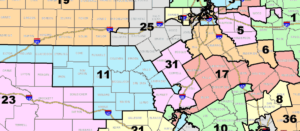Concerned Women for America (CWA) joined Advancing American Freedom and some 70 other organizations, asking the U.S. District Court for the Southern District of Ohio to follow clear Supreme Court precedent and protect our supporters’ First Amendment constitutional rights.
For years, CWA has fought fearlessly against Big Government’s continual push to infringe on our supporter’s constitutional rights to freedom of speech and association. Just a few years ago, the United States Supreme Court gave us a resounding victory in Americans for Prosperity Foundation v. Bonta, where the Court declared, “California’s disclosure requirement [was] facially invalid because it burdens donors’ First Amendment rights and [was] not narrowly tailored to an important government interest.”
In that case, California wanted to force all non-profits that solicit support in the state to disclose to the government sensitive information about their major donors in a blatant violation of the First Amendment to the U.S. Constitution. Thankfully, the Supreme Court stepped in and prevented the illegal and immoral push to silence and punish any voice contradicting the government’s preferred narratives.
Similarly, today, in a case called Buckeye Institute v. IRS, we are standing in support of a challenge to a tax law that forces the IRS to demand that non-profit charities hand over the private information of their largest donors every year. In our brief before the court, we argue, “[J]ust like California, the IRS cannot demonstrate any need for its sweeping, up-front compelled collection of 501(c)(3) organizations’ donor information, and its long history of mishandling confidential information threatens to chill donors’ First Amendment rights to speech and association.”
These requirements are insidious. They provide virtually no benefit but the fact that the government gets to chill speech that it does not approve of through fear and intimidation of political retribution if you dare associate with anyone upon whom they frown. As the brief points out, “the IRS routinely mishandles tax-exempt entities’ information, is unable to prevent rogue employees from publicly disclosing taxpayer information, and has failed to adequately protect taxpayer information from external threats. These failures of confidentiality render the disclosure regime at issue just as constitutionally infirm as the one in Bonta.”






